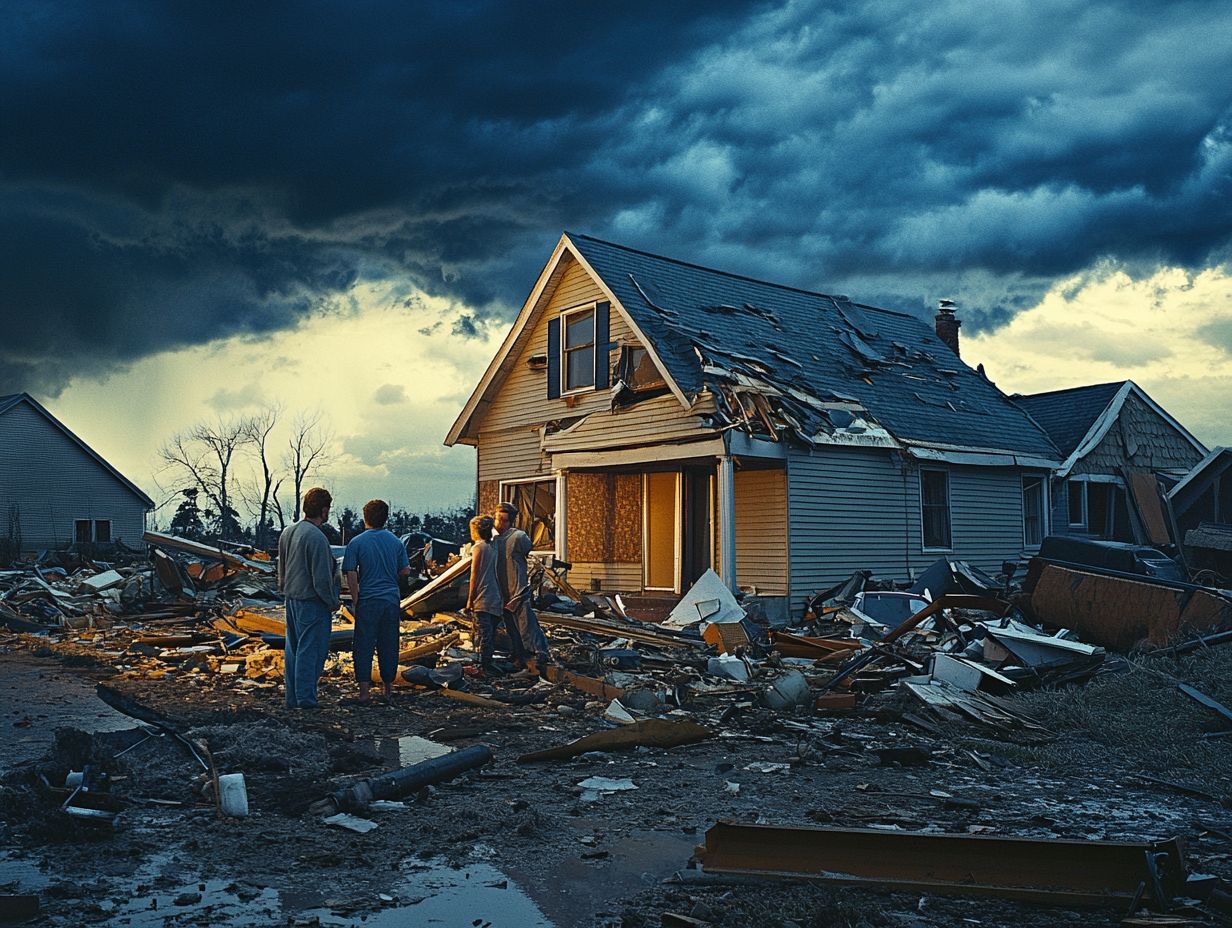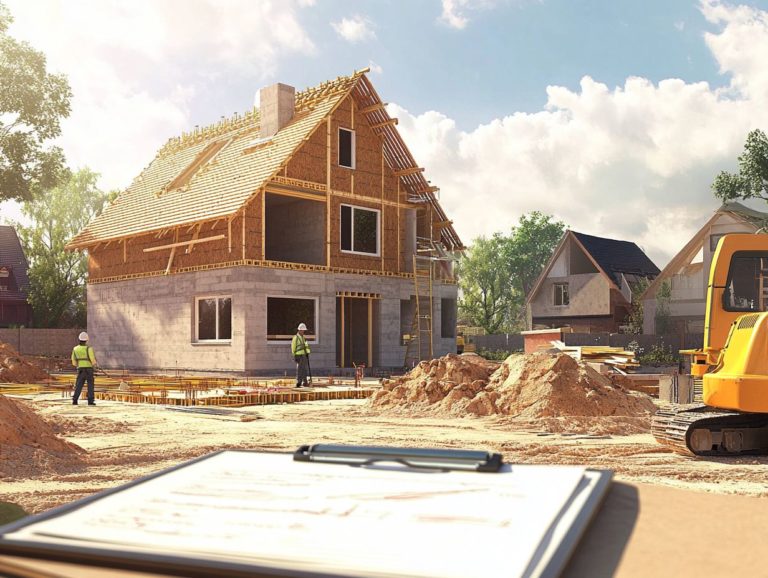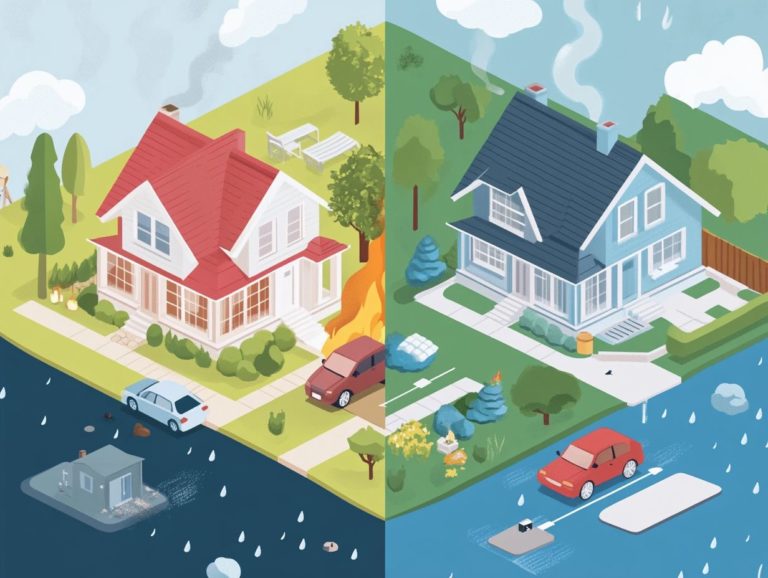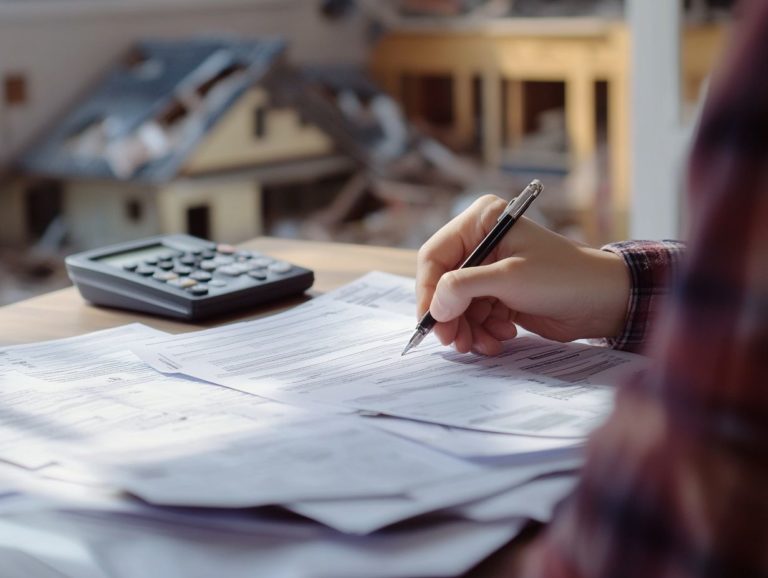Can Home Insurance Cover Natural Disasters?
Home insurance often serves as your safety net, but you might find yourself questioning how effectively it protects against natural disasters.
Understanding the intricacies of home insurance coverage is essential, particularly when it comes to events like floods, earthquakes, and hurricanes. This article unpacks what typical home insurance covers, sheds light on significant exclusions, and delves into the specific natural disasters that may fall under its umbrella.
You’ll find a discussion on limitations, restrictions, and optional coverage, all aimed at ensuring you’re well-prepared for the unexpected. Dive in to uncover how to fortify your home against nature s unpredictable surprises.
Contents
- Key Takeaways:
- Understanding Home Insurance Coverage
- Natural Disasters Covered by Home Insurance
- Limitations and Restrictions for Natural Disaster Coverage
- Additional Coverage Options for Natural Disasters
- Frequently Asked Questions
- Can Home Insurance Cover Natural Disasters?
- What Types of Natural Disasters Are Typically Covered by Home Insurance?
- What Is Not Typically Covered by Home Insurance for Natural Disasters?
- Can Home Insurance Cover the Cost of Rebuilding My Home After a Natural Disaster?
- Will My Personal Belongings Be Covered by Home Insurance in the Event of a Natural Disaster?
- What Should I Do If My Home Is Damaged by a Natural Disaster?
Key Takeaways:
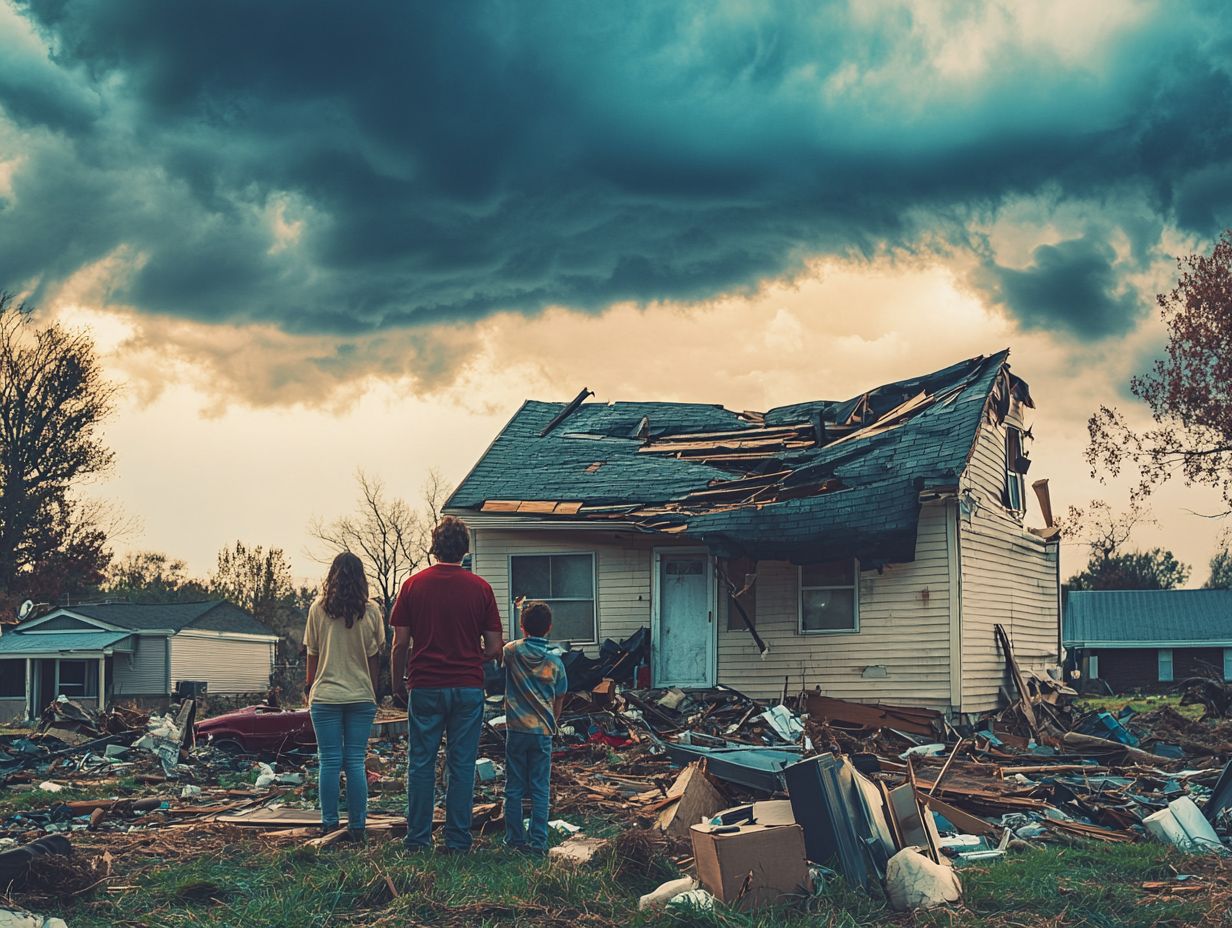
Home insurance generally covers natural disasters, but always check your specific policy. Review what’s covered, such as hurricanes and wildfires, to avoid surprises. Additionally, you might want to know does home insurance cover earthquake damage? If your area is prone to certain disasters, consider additional coverage to stay secure.
Understanding Home Insurance Coverage
Understanding home insurance coverage is essential for homeowners like you who are looking to secure financial protection against many risks that come with property ownership.
Whether it s shielding your home from fire damage, tornadoes, or other unexpected disasters, a comprehensive insurance policy is your best line of defense. It ensures that both your dwelling and personal belongings are well-protected.
By getting acquainted with different types of coverage, such as the HO-3 Special Form which offers broad coverage for your house you can sidestep common coverage gaps that might leave you exposed.
Working with a good insurance agent helps you understand your policy well and ensures you re fully aware of your rights when it s time to engage with a claims adjuster.
What Does Home Insurance Typically Cover?
Homeowners insurance typically covers various incidents that could impact your property and personal belongings, offering essential financial protection.
This type of insurance generally includes dwelling coverage, which shields the physical structure of your home against risks like fire, storms, and vandalism.
Personal property protection is equally vital; it helps replace or repair items within your home, such as furniture, electronics, and clothing, in case of theft or damage.
Another key component is liability coverage, which protects you against legal claims if someone gets injured on your property.
Understanding these elements is crucial, as they not only safeguard your assets but also provide peace of mind during those unexpected moments life throws your way.
Important Exclusions to Consider
While homeowners insurance provides valuable coverage, it s crucial for you to understand the exclusions that could create gaps in your policy. Many standard policies notably exclude damages caused by floods or earthquakes, which means you could face significant financial burdens after such disasters.
Without supplemental policies to bridge these gaps, you might find yourself unprotected when nature decides to unleash its fury. Navigating the complexities of insurance deductibles the amount you pay out of pocket before insurance helps cover the rest tied to these exclusions can be quite confusing.
Knowing your out-of-pocket costs is crucial for your financial security. Familiarizing yourself with these factors enables you to make informed decisions and plays a vital role in ensuring that your home remains adequately protected.
Natural Disasters Covered by Home Insurance
Natural disasters can strike without warning, presenting considerable risks to homeowners like you.
However, a comprehensive homeowners insurance policy can offer vital financial protection against a range of calamities, including damage from floods, earthquakes, hurricanes, and tornadoes.
Examples of Natural Disasters Covered
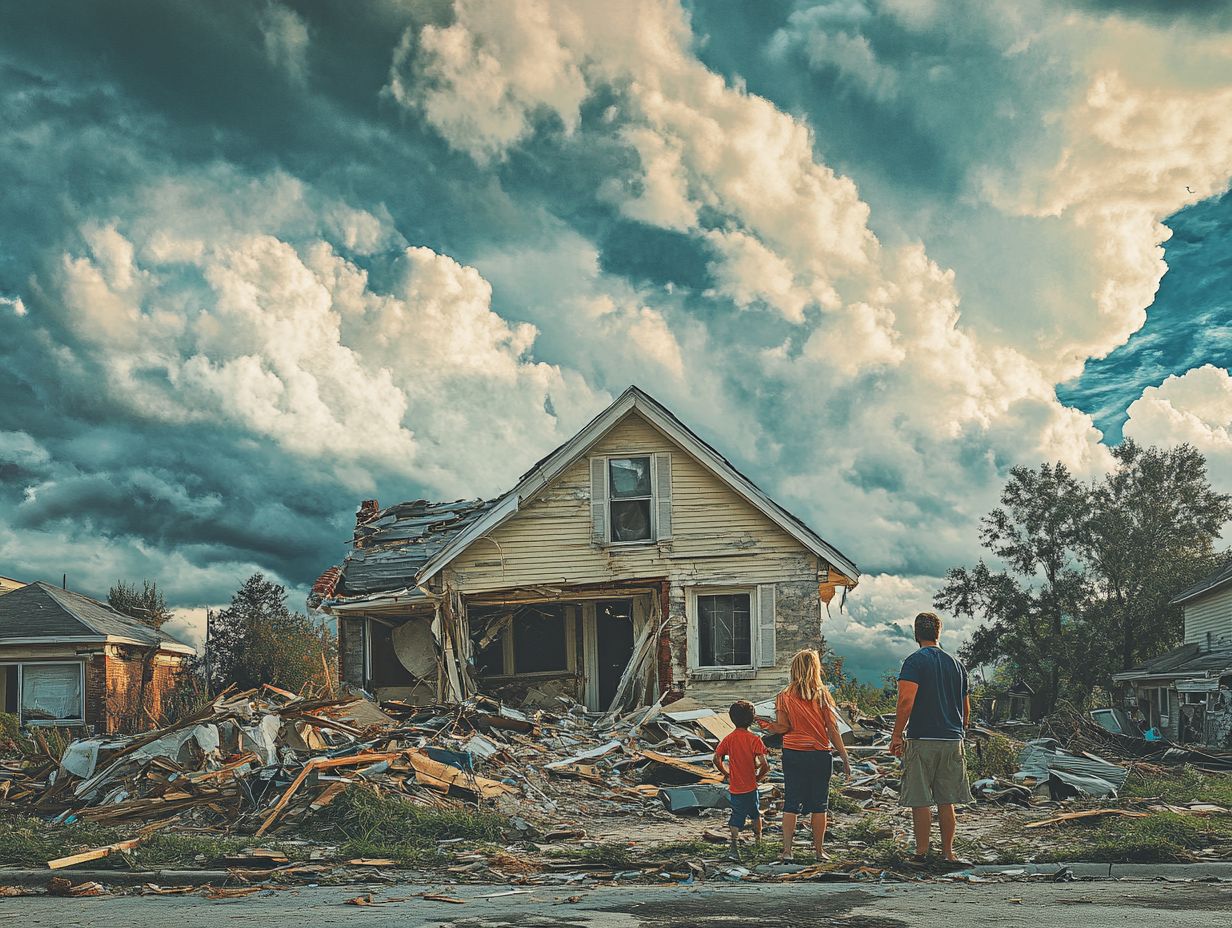
Homeowners insurance typically covers many natural disasters. This includes hurricane, tornado, and fire damage, each causing significant harm to properties. Understanding the impact of natural disasters on home insurance is crucial for homeowners.
As a homeowner, it’s vital to know the specific risks of these disasters. If you live in a coastal area susceptible to hurricanes, your coverage can assist with repairs to roofs and windows damaged by relentless winds and rain.
If you’re in a tornado-prone area, your policy might cover structural damage and personal belongings affected by those fierce storms.
Fire damage, whether from wildfires or electrical issues, generally falls under coverage as well. Most standard policies include provisions for temporary housing if your home becomes uninhabitable.
By recognizing the risks specific to your locality, you can ensure you have the right coverage tailored to your needs. This enables a smoother recovery in the aftermath of a disaster.
Specific Coverage for Different Types of Disasters
Homeowners insurance doesn’t always provide blanket coverage for every type of natural disaster. For instance, you may wonder if home insurance covers landscaping damage. Specialized policies, such as flood insurance and earthquake insurance, are essential for ensuring comprehensive protection.
Note that while standard policies might offer a degree of protection, they often exclude significant perils like landslides, hurricanes, and wildfires. Therefore, evaluating the unique risks associated with your geographical location is crucial.
Consider additional specialized insurance options to adequately safeguard your property. Understanding the fine print in your policy documents is imperative.
Take the time to review coverage limits and exclusions, as these can vary greatly from one insurer to another. By being diligent, you ensure that you won t be left vulnerable when a natural disaster strikes.
Limitations and Restrictions for Natural Disaster Coverage
Grasping the limitations and restrictions of natural disaster coverage in homeowners insurance is essential for you as a homeowner. This knowledge enables you to secure adequate protection against unforeseen events.
Policy Limits and Deductibles
Policy limits and deductibles are pivotal in shaping the financial protection you receive when a natural disaster strikes. A deductible is the amount you pay before insurance kicks in, and these financial elements can greatly influence the claims process.
For instance, standard deductibles usually require you to cover a fixed amount before your insurance begins to take over. This amount can vary based on your specific policy.
Conversely, disaster deductibles are often calculated as a percentage of the total insured value. They can change depending on the severity and nature of the disaster think hurricanes versus wildfires.
Grasping these distinctions is crucial for you as a homeowner. This enables you to customize your coverage effectively.
Geographical Restrictions
Geographical restrictions can profoundly impact the availability and terms of homeowners insurance, particularly in regions susceptible to natural disasters like floods and earthquakes.
In these high-risk areas, you may encounter increased insurance premiums or find your coverage options significantly limited. Take coastal regions prone to hurricanes; your policy might be influenced by data from reputable sources such as NOAA.
If you’re in an earthquake zone like California, you ll likely need specialized policies to tackle seismic risks, often governed by FEMA guidelines.
As insurance providers adapt to the unique challenges posed by different locations, understanding how these geographical factors influence your insurance options becomes essential.
Additional Coverage Options for Natural Disasters
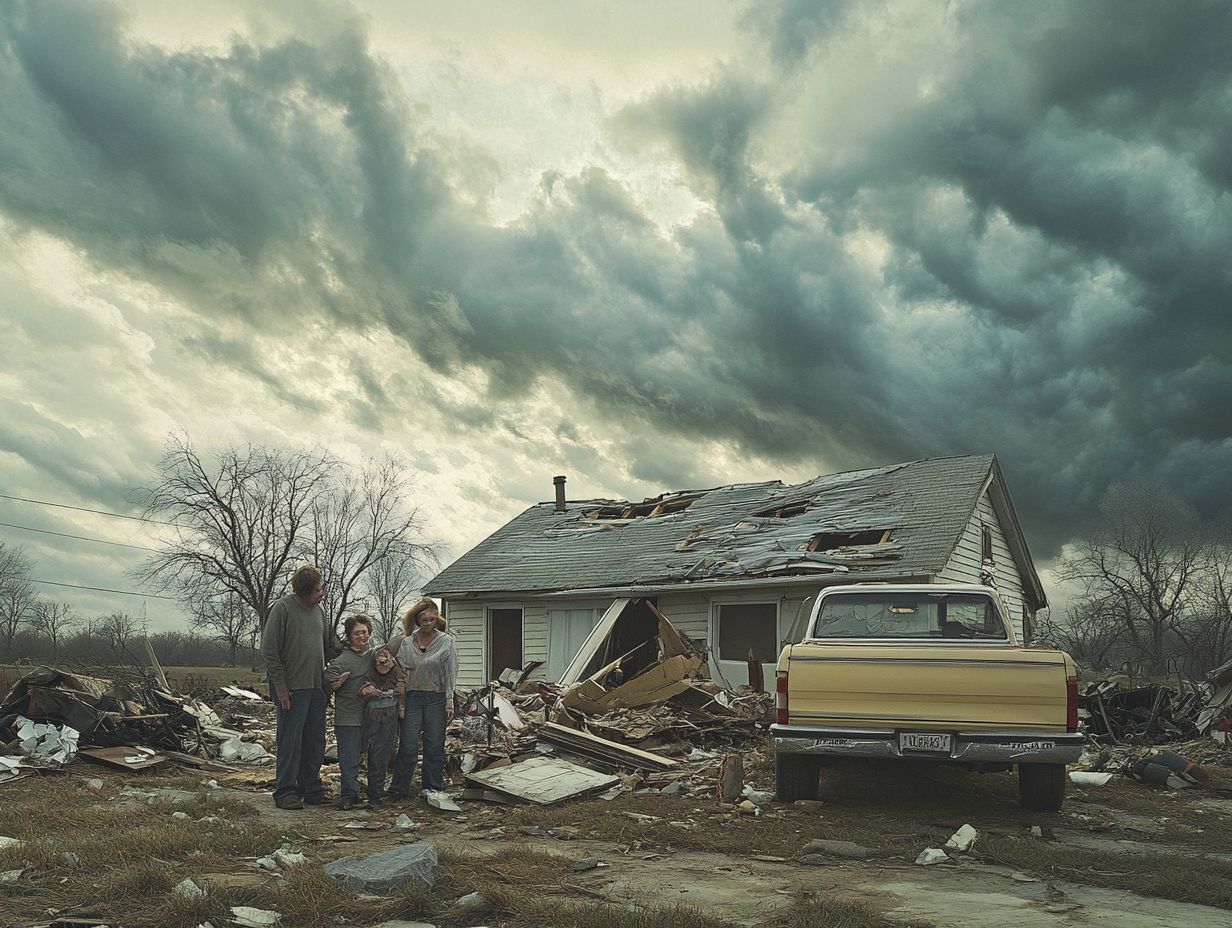
In addition to standard homeowners insurance, explore extra coverage options. This will help protect your finances against natural disasters, ensuring that your financial security remains robust and comprehensive.
Supplemental Policies and Riders
Extra insurance options can significantly enhance your homeowners insurance by providing an additional layer of coverage for risks typically excluded from standard policies.
These specialized options, such as flood and earthquake coverage, offer critical protection against disasters that a basic policy might overlook. You may find yourself exposed to specific threats, so it s essential to assess the unique risks associated with your geographic location.
By evaluating your circumstances and potential hazards, you can determine whether additional policies would provide the peace of mind you seek.
Integrating these extra policies allows you to create a more comprehensive safety net, ensuring that unexpected events won t result in financial strain or unnecessary stress.
How Government Programs Can Help You After a Disaster
Government assistance programs, like those provided by FEMA, can offer essential financial protection for homeowners facing the aftermath of natural disasters. These programs serve as a valuable complement to existing insurance coverage.
They are specifically designed to bridge the gaps that often arise in standard homeowners insurance, especially in regions prone to hurricanes, floods, or wildfires. For example, while your homeowners insurance might cover damage from wind, it often falls short when it comes to flooding. Programs such as the National Flood Insurance Program (NFIP) step in to provide specialized coverage that addresses this shortcoming.
To qualify for these assistance programs, you typically need to reside in designated disaster areas and demonstrate a direct impact from the event, which may include significant property damage or loss of income as a result of the disaster.
Frequently Asked Questions
Can Home Insurance Cover Natural Disasters?
Yes, in most cases, home insurance can cover natural disasters. Be sure to check your policy for coverage details, especially regarding flood damage, so you don’t want to be caught off guard!
What Types of Natural Disasters Are Typically Covered by Home Insurance?
Most home insurance policies cover natural disasters like hurricanes, tornadoes, wildfires, and earthquakes. However, it’s important to understand the home insurance types that cover natural disasters, as some policies may also include coverage for floods and landslides, while others may require separate policies for these types of disasters.
What Is Not Typically Covered by Home Insurance for Natural Disasters?
Most home insurance policies do not cover damage caused by floods, earthquakes, and landslides. If you’re wondering does home insurance cover structural damage, it’s important to note that in a high-risk area for certain natural disasters, such as a hurricane-prone region, you may need to purchase additional coverage for those specific events.
Can Home Insurance Cover the Cost of Rebuilding My Home After a Natural Disaster?
Yes, most home insurance policies include coverage for rebuilding or repairing your home after a natural disaster. However, it’s crucial to understand whether home insurance covers mold damage, as the amount of coverage may depend on your specific policy details. Be sure to review the coverage limits to ensure they are sufficient for your needs.
Will My Personal Belongings Be Covered by Home Insurance in the Event of a Natural Disaster?
Yes, most home insurance policies include coverage for personal belongings, such as furniture, electronics, and clothing, in the event of a natural disaster. However, there may be limits to the amount of coverage, and certain high-value items may require separate coverage.
What Should I Do If My Home Is Damaged by a Natural Disaster?
If your home is damaged by a natural disaster, the first step is to contact your insurance company and file a claim. They will guide you through the process and help you determine what is covered under your policy. It s also crucial to document any damage with photos and keep receipts for any repairs or replacements needed.
Don t wait until it’s too late review your coverage today!

